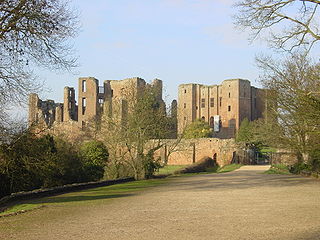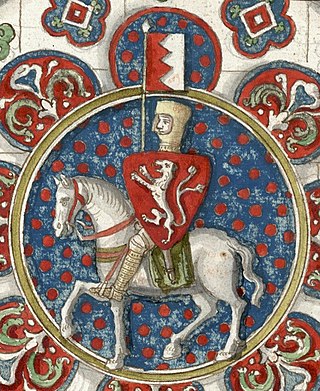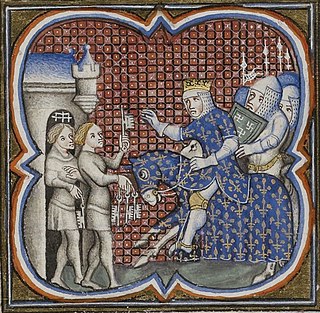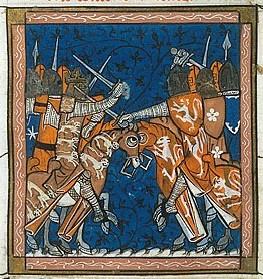
The Dictum of Kenilworth, issued on 31 October 1266, was a pronouncement designed to reconcile the rebels of the Second Barons' War with the royal government of England. After the baronial victory at the Battle of Lewes in 1264, Simon de Montfort took control of royal government, but at the Battle of Evesham the next year Montfort was killed, and King Henry III restored to power. A group of rebels held out in the stronghold of Kenilworth Castle, however, and their resistance proved difficult to crush.

Magna Carta Libertatum, commonly called Magna Carta or sometimes Magna Charta, is a royal charter of rights agreed to by King John of England at Runnymede, near Windsor, on 15 June 1215. First drafted by the Archbishop of Canterbury, Cardinal Stephen Langton, to make peace between the unpopular king and a group of rebel barons, it promised the protection of church rights, protection for the barons from illegal imprisonment, access to swift and impartial justice, and limitations on feudal payments to the Crown, to be implemented through a council of 25 barons. Neither side stood by their commitments, and the charter was annulled by Pope Innocent III, leading to the First Barons' War.

Stephen Langton was an English cardinal of the Catholic Church and Archbishop of Canterbury from 1207 until his death in 1228. The dispute between King John of England and Pope Innocent III over his election was a major factor in the crisis which produced the Magna Carta in 1215. Langton is also credited with having divided the Bible into the standard modern arrangement of chapters used today.

Year 1265 (MCCLXV) was a common year starting on Thursday of the Julian calendar.

Simon de Montfort, 6th Earl of Leicester, later sometimes referred to as Simon V de Montfort to distinguish him from his namesake relatives, was a nobleman of French origin and a member of the English peerage, who led the baronial opposition to the rule of King Henry III of England, culminating in the Second Barons' War. Following his initial victories over royal forces, he became de facto ruler of the country, and played a major role in the constitutional development of England.
The Battle of Evesham was one of the two main battles of 13th century England's Second Barons' War. It marked the defeat of Simon de Montfort, Earl of Leicester, and the rebellious barons by the future King Edward I, who led the forces of his father, King Henry III. It took place on 4 August 1265, near the town of Evesham, Worcestershire.

Louis VIII, nicknamed The Lion, was King of France from 1223 to 1226. As prince, he invaded England on 21 May 1216 and was excommunicated by a papal legate on 29 May 1216. On 2 June 1216, Louis was proclaimed "King of England" by rebellious barons in London, though never crowned. He soon seized half the English kingdom but was eventually defeated by the English and after the Treaty of Lambeth, was paid 10,000 marks, pledged never to invade England again, and was absolved of his excommunication.
Edmund, 1st Earl of Lancaster, also known by his epithet Edmund Crouchback, was a member of the royal Plantagenet Dynasty and the founder of the first House of Lancaster. He was Earl of Leicester (1265–1296), Lancaster (1267–1296) and Derby (1269–1296) in England, and Count Palatine of Champagne (1276–1284) in France.

The Second Barons' War (1264–1267) was a civil war in England between the forces of a number of barons led by Simon de Montfort against the royalist forces of King Henry III, led initially by the king himself and later by his son, the future King Edward I. The barons sought to force the king to rule with a council of barons, rather than through his favourites. The war also involved a series of massacres of Jews by de Montfort's supporters, including his sons Henry and Simon, in attacks aimed at seizing and destroying evidence of baronial debts. To bolster the initial success of his baronial regime, de Montfort sought to broaden the social foundations of parliament by extending the franchise to the commons for the first time. However, after a rule of just over a year, de Montfort was killed by forces loyal to the king at the Battle of Evesham.
Peter de Montfort of Beaudesert Castle was an English magnate, soldier and diplomat. He is the first person recorded as having presided over Parliament as a parlour or prolocutor, an office now known as Speaker of the House of Commons. He was one of those elected by the barons to represent them during the constitutional crisis with Henry III in 1258. He was later a leading supporter of Simon de Montfort, 6th Earl of Leicester against the King. Both he and Simon de Montfort were slain at the Battle of Evesham on 4 August 1265.

Lady Elizabeth de Montfort, Baroness Montagu was an English noblewoman.
David A. Carpenter is an English historian and writer, and Professor of Medieval History at King's College London where he has been working since 1988. Carpenter specialises in the life and reign of Henry III. Historian Dan Jones described him as "one of Britain's foremost medievalists".
Events from the 1260s in England.
Events from the 1210s in England.
Maud de Braose, Baroness Mortimer of Wigmore was a noble heiress, and one of the most important, being a member of the powerful de Braose family which held many lordships and domains in the Welsh Marches. She was the wife of Roger Mortimer, 1st Baron Mortimer of Wigmore, a celebrated soldier and Marcher baron.

William Montagu, 2nd Baron Montagu, was an English peer, and an eminent soldier and courtier during the reigns of Edward I and Edward II. He played a significant role in the wars in Scotland and Wales, and was appointed steward of the household to Edward II. Perhaps as a result of the influence of his enemy, Thomas, 2nd Earl of Lancaster, Edward II sent him to Gascony as Seneschal in 1318. He died there in October of the following year.
The Philip Leverhulme Prize is awarded by the Leverhulme Trust to recognise the achievement of outstanding researchers whose work has already attracted international recognition and whose future career is exceptionally promising. The prize scheme makes up to thirty awards of £100,000 a year, across a range of academic disciplines.
Henry Summerson is an English historian. He is the author of a number of books.

John FitzHugh was an Anglo-Norman royal counsellor to King John of England.
Lowther Castle Stead is a medieval site in Cumbria, possibly a ringwork castle. Lancaster University Archaeology Unit carried out a survey of the earthworks in 1997. The castle is 330 metres (360 yd) south of the Church of St Michael which, which dates to at least the late 12th century.








